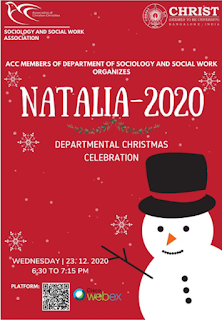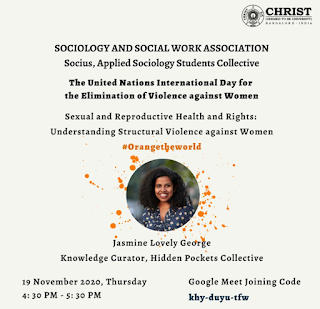India faces both unique challenges and unprecedented opportunities in the sphere of public health. The COVID-19 pandemic has revealed the fragility of the public health care systems, urging governments around the world to revisit their public health policies. In August 2020, Socius, Applied Sociology Students Collective of the Department of Sociology and Social Work, organised a lecture series on the Theme ‘Talking Public Health, circa COVID-19.’ The lecture series offered a platform to initiate discussion on a wide array of topics that play a decisive role in shaping the course of public health policies in India.
The first lecture of the series, ‘COVID-19 and Lessons for Public Health Systems’ was organised on the 8th of August. The lecture was delivered by Dr T Sundararaman, Global Coordinator, People’s Health Movement. He discussed the necessity of a paradigm shift in the public health discourse in India. From the origin of the modern public health discourse to the public-private nexus in health service delivery, Dr Sundararaman offered an illuminating lecture, laying a strong foundation for further discussions and debates on public health discourse in India.
The second lecture of the series ‘Decentralization and Community Participation in COVID Control - IKerala Experience’ was conducted on the 17th of August and was delivered by Dr Jayasree A K, Head of the Department of Community Medicine at the Academy of Medical Sciences, Pariyaram, Kerala.
Dr Jayasree extensively discussed decentralised governance and community participation in public health and in the fight against COVID19, with regard to the measures taken by the Government of Kerala to control the spread of the virus. The speaker suggested that decades of investment in public health and a long history of social reform movements rooted in the egalitarian principles of development, social justice, and equality, have paved the way for the successful containment of COVID-19 in Kerala. Dr Jayasree stressed the importance of community participation under the leadership of empowered local governments as one of the most effective strategies in COVID-19 control.

On August 22, the third lecture of the public health lecture series was organised on the topic ‘Reimagining the Urban in the Post COVID India.’ The speaker Dr. Piush Antony is a Social Policy Specialist at UNICEF India. The enlightening lecture offered a new perspective into understanding public health in the post-COVID world. The lecture covered a wide array of topics ranging from the dynamics of "the new normal" to the politics of social distancing.
The final lecture of the series ‘Social Determinants of Health: Towards a Humanitarian Approach to Public Health,’ was delivered on 27th August 2020 by Dr Asima Jena, Assistant Professor, Department of Sociology, University of Hyderabad. Dr Jena discussed the importance of developing a humanitarian approach towards public health policies in the post-COVID 19 era which requires a broad array of disciplines to inform and influence the totality of their precept and practice to advance global health.
The lecture series brought together public health experts from various fields and has established a platform that encourages more discussions on the importance of a fresh perspective into public health in the post-COVID 19 world.














